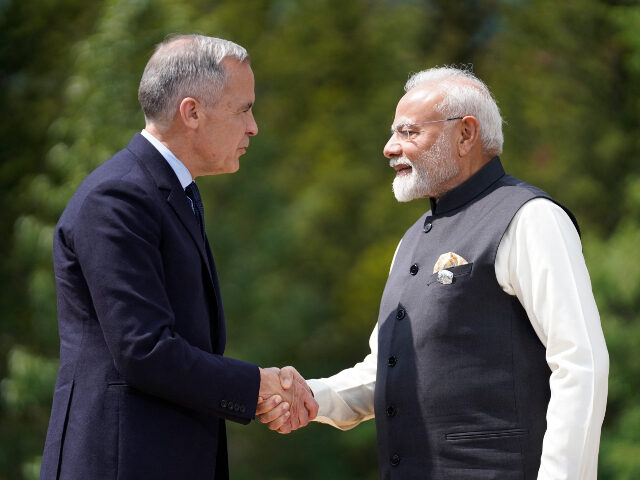Canada and India Restore Diplomatic Ties, Ending Trudeau-Era Rift over Sikh Activist

Indian Prime Minister Narendra Modi concluded a visit to Canada on Tuesday with a meeting with his host, Prime Minister Mark Carney, that resulted in the restoration of normal diplomatic relations and a promise to cooperate on trade, critical minerals, and a “free and open Indo-Pacific.”
The meeting was the first between the two heads of government and took place on the sidelines of the annual G7 Summit, which took place in Kananaskis, Alberta, this year. India is not a member of the G7 bloc but hosts often invite foreign leaders of nations with significant ties to its members to the event. Along with Modi, Carney invited Ukrainian President Volodymyr Zelensky, Mexican President Claudia Sheinbaum, and South Korean President Lee Jae-myung, among others.
Relations between India and Canada deteriorated significantly under Carney’s predecessor, fellow Liberal Party Prime Minister Justin Trudeau. Trudeau alienated many in India with elaborate, bizarre outfits worn during his visit to the country in 2018, but more significantly harmed ties to the country by accusing Modi’s Hindu nationalist government of persecuting dissidents in Canada. Trudeau claimed last year that Ottawa had evidence of Indian government involvement in the assassination of Sikh activist Hardeep Singh Nijjar in British Columbia, prompting both countries to expel diplomats and downgrade bilateral ties.
Sikh migration to Canada began in significant amounts in the early 19th century. Under Trudeau, however, Canada dramatically increased the number of immigrants it welcomed from around the world, including India. Simultaneously, Modi’s Hindu nationalist Bharatiya Janata Party (BJP) has enacted policies alienating and in some cases persecuting religious minorities, including Sikhs, Christians, and Muslims, leading to greater opposition to his government from Indians abroad. The Indian government has expressed particular concern about a Sikh nationalist movement seeking to establish an independent nation of “Khalistan” carved out of India; Nijjar was a prominent leader in the Khalistani movement.
Modi’s invitation to the G7 prompted widespread protests by Sikh activists in Canada this week.
“We want everyone in Canada to know that this is not just a Sikh issue,” Sikh activist Moninder Singh told reporters this week. “This is actually a Canadian issue, and India using violence, intimidation, threats, and coercion to force Canadians to bend the knee to them and to toe the line that they want toed, whether it’s our politicians, our media, or the average citizen.”
The Canadian Prime Minister’s Office stated that Carney raised the issue of “transnational crime and repression” with Modi, but did not offer specifics on the conversation. A similar readout of the meeting from Modi’s office did not use the term “transnational repression” but acknowledged that the leaders expressed “commitment to upholding the principles of sovereignty and territorial integrity.”
“The leaders agreed to designate new high commissioners, with a view to returning to regular services to citizens and businesses in both countries,” the Canadians confirmed. “They [Carney and Modi] discussed strong and historic ties between our peoples, partnerships in the Indo-Pacific, and significant commercial links between Canada and India – including partnerships in economic growth, supply chains, and the energy transformation.”
The return of the high commissioners and full diplomatic services for their citizens in the other respective country reverses Trudeau-era decisions last year that limited the availability of Canadian consular services in India. In October, Trudeau’s government announced that it had identified six India officials in Canada that “leveraged their official positions to engage in clandestine activities, such as collecting information for the government of India, either directly or through their proxies.” Some, it claimed, were linked to the killing of Nijjar.
India expelled Canadian officials from the country in response.
The Indian readout focused more in detail on the areas of potential cooperation between the countries, primarily trade engagement. Modi’s government has prioritized investment in its manufacturing sector – competing directly for business from technology companies with China – and exporting more of its goods around the world.
“The leaders discussed opportunities for future collaboration in areas such as clean energy, digital transformation, artificial intelligence, LNG, food security, critical minerals, higher education, mobility, and supply chain resilience,” the Indian Prime Minister’s Office shared. “They reaffirmed their shared interest in promoting a free and open Indo-Pacific.”
“Free and open Indo-Pacific” is a term believed to have originated in Japanese foreign policy referring to opposition to the Chinese Communist Party’s illegal conquest operations in the South China Sea. China claims nearly the entirety of the South China Sea, invading maritime territory belonging to Taiwan, Malaysia, Brunei, Vietnam, and the Philippines. The “Free and Open Indo-Pacific” strategy was a core element of President Donald Trump’s foreign policy during his first term and continues to be so. India’s key geographical position in the region has elevated its influence in implementing the policy.
The Indian government added that Carney and Modi agreed on the importance of “shared democratic values, respect for the rule of law, and commitment to upholding the principles of sovereignty and territorial integrity.”
“They underlined the need to pursue a constructive and balanced partnership grounded in mutual respect for concerns and sensitivities,” the statement continued, “strong people-to-people ties, and growing economic complementarities.”
Carney, in remarks to the press during his meeting with Modi, called it a “great honor” to host the India leader. Modi later said in a social media statement that India and Canada shared “a strong belief in democracy” and expressed hope that the two could continue to work “closely” together.
The reset was clouded by a report by the Canadian Security Intelligence Service (CSIS) on Tuesday accusing India of continuing to engage in foreign interference in Canadian affairs. The report did not single out India alone – it also identified Russia, Iran, and China as threats – but reasserted accusations that the Indian government played a role in Nijjar’s assassination.